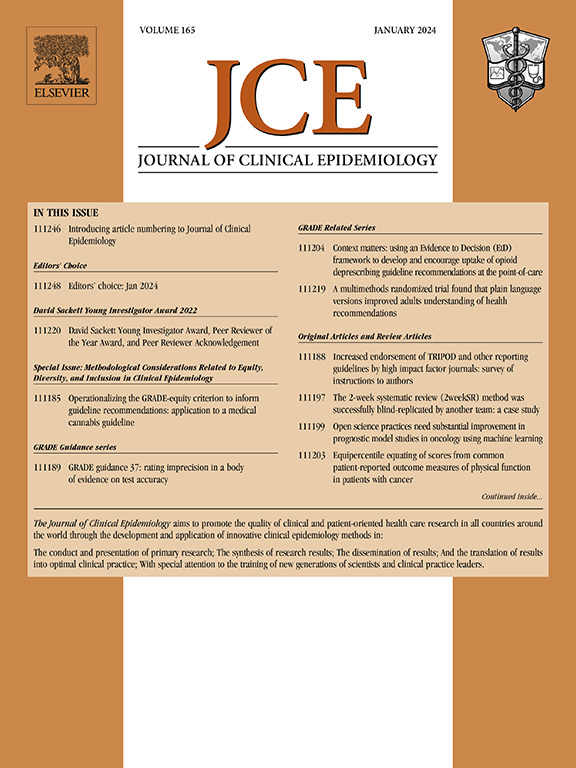Informative statements to communicate the findings of systematic reviews of interventions: cross-cultural translation of Grading of Recommendations, Assessment, Development and Evaluation plain language into Portuguese language
IF 5.2
2区 医学
Q1 HEALTH CARE SCIENCES & SERVICES
引用次数: 0
Abstract
Objective
Transparent and easy-to-understand communication can enhance the dissemination of systematic reviews (SRs) results to interest holders. The Grading of Recommendations, Assessment, Development and Evaluation (GRADE) Working Group developed an approach to improve the communication of results from SR of interventions in the English language. Here, we present the cross-cultural translation into Brazil Portuguese language of this approach.
Study Design and Setting
The cross-cultural adaptation of the approach to communicate the results into Brazilian Portuguese followed three steps: a) a qualitative research method was used to translate the informative statements designed by the GRADE Working Group and culturally adapted them into Brazilian Portuguese; b) Brazilian experts in evidence synthesis evaluated the content validity of the translated statements; and c) a quantitative cross-sectional study assessed the reliability and acceptability of the translated sentences.
Results
One of the main challenges was adjusting the terms related to the classification of low and moderate certainty of evidence. Experts suggested the adoption of “average” instead "moderate" for effect size to avoid misleading in Portuguese, as it is also used for the classification of certainty of evidence. The group proposed to use the term "average effect" as an alternative to "moderate effect.” Low acceptability (<50%) was found in for some statements of low certainty of evidence.
Conclusion
The main contributions of this study were related to adjustments of English terms that are prone to diverse interpretations but share a similar translation in Portuguese. Through cultural adaptation processes, it is possible to ensure a higher level of understanding and clarity, enhancing the effectiveness of the use of GRADE in decision-making process.
信息性陈述,以传达干预措施系统回顾的结果:GRADE普通语言到葡萄牙语的跨文化翻译。
目的:透明易懂的沟通方式可以促进系统评价结果向利益相关者的传播。GRADE工作组开发了一种方法,以改进英语语言中干预措施SR结果的交流。在这里,我们提出了这种跨文化翻译巴西葡萄牙语的方法。研究设计和设置:将研究结果转化为巴西葡萄牙语的跨文化适应方法分为三个步骤:a)使用定性研究方法将GRADE工作组设计的信息陈述翻译成巴西葡萄牙语并进行文化适应;b)巴西证据综合专家评估了翻译后陈述的内容有效性;C)定量横断面研究评估了翻译句子的可靠性和可接受性。结果:主要的挑战之一是调整与低和中等证据确定性分类相关的术语。专家建议采用“平均”而不是“中等”来表示效果大小,以避免在葡萄牙语中产生误导,因为它也用于对证据的确定性进行分类。该小组建议使用“平均效果”一词来代替“中等效果”。一些证据确定性较低的陈述可接受性较低(< 50%)。结论:本研究的主要贡献与英语术语的调整有关,这些术语往往有不同的解释,但在葡萄牙语中有相似的翻译。通过文化适应过程,可以确保更高水平的理解和清晰度,从而提高在决策过程中使用GRADE的有效性。
本文章由计算机程序翻译,如有差异,请以英文原文为准。
求助全文
约1分钟内获得全文
求助全文
来源期刊

Journal of Clinical Epidemiology
医学-公共卫生、环境卫生与职业卫生
CiteScore
12.00
自引率
6.90%
发文量
320
审稿时长
44 days
期刊介绍:
The Journal of Clinical Epidemiology strives to enhance the quality of clinical and patient-oriented healthcare research by advancing and applying innovative methods in conducting, presenting, synthesizing, disseminating, and translating research results into optimal clinical practice. Special emphasis is placed on training new generations of scientists and clinical practice leaders.
 求助内容:
求助内容: 应助结果提醒方式:
应助结果提醒方式:


